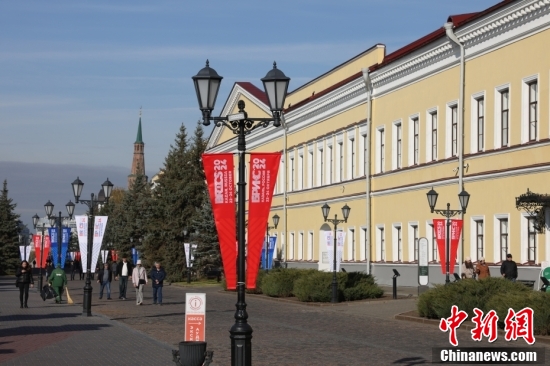
Banners for the 16th BRICS Summit were hung along a street in Kazan, Russia, on Oct. 20, 2024. (Photo: China News Service/Sheng Jiapeng)
(ECNS) -- The 16th BRICS Summit, to be held from Tuesday to Thursday in Kazan, Russia, has drawn global attention as it marks the first gathering since the group's expansion. This summit is expected to bring new opportunities for economic and trade cooperation between China and other BRICS nations.
Chongyang Institute for Financial Studies of Renmin University Research Fellow Liu Ying stated that by enhancing economic and trade exchanges, BRICS countries have achieved complementary advantages and strong partnerships, becoming an important engine to oppose trade protectionism and promote global economic growth.
Economic and trade relations among BRICS countries are becoming increasingly close.
After the expansion of BRICS in January, China's imports and exports to member countries reached 4.62 trillion yuan ($650 billion) in the first three quarters, a year-on-year increase of 5.1 percent.
In the industrial sector, China’s exports of intermediate goods such as steel and raw textiles to other BRICS countries grew by 8.6 percent and 13.4 percent in the first three quarters, respectively, compared to the same period last year.
In the financial sector, NDB has approved over 100 projects to date, with a total amount exceeding $34 billion. This has provided strong support for emerging market countries and developing nations by expanding financing channels and addressing gaps in infrastructure.
Trade in agricultural products has also been robust. In the first three quarters of this year, over 80 percent of China’s poultry and frozen cod and 50 percent of crabs were imported from BRICS member countries.
Additionally, China's exports of garlic, tomatoes, and citrus fruit are popular among BRICS countries.
The remarkable success of BRICS economic and trade cooperation is due to strong development needs, willingness to collaborate, and high degree of economic complementarity.
Wang Youxin, a senior researcher at the Bank of China Research Institute, stated that BRICS countries are at different stages of industrial development. The characteristics of such development in each country create favorable conditions for promoting industrial transfer and market expansion within the BRICS group.
Liu said that BRICS nations not only possess abundant resource reserves but also advanced manufacturing industries and a vast market, with distinct advantages in various technological fields.
What’s even more commendable is that BRICS nations have transcended the outdated notion of zero-sum competition, embracing a new philosophy of mutual benefit and win-win in their economic and trade collaboration, according to Liu.
However, while BRICS countries have achieved significant results in economic and trade cooperation, there is still considerable room for improvement.
For instance, relatively few free trade agreements have been signed among member states, and trade links between them need to be strengthened. Additionally, mechanisms for economic and trade cooperation require further refinement.
As noted by Xu Xiujun, researcher at the Institute of World Economics and Politics at the Chinese Academy of Social Sciences, the developing countries represented by BRICS share similar levels of economic development and face the same challenges.
In the context of sluggish global economic growth, how can BRICS countries build a stronger economic and trade network? This is key not only to the interests of its members but also to the unity of Global South nations and the future of the world economy.
编辑:徐璇